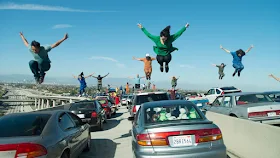Sebastian Wilder: Ryan Gosling
Mia Dolan: Emma Stone
Keith: John Legend
Laura Wilder: Rosemarie DeWitt
Greg Earnest: Finn Wittrock
Bill: J.K. Simmons
David: Tom Everett Scott
Director: Damien Chazelle
Screenplay: Damien Chazelle
Cinematography: Linus Sandgren
Production design: David Wasco
Film editing: Tom Cross
Music: Justin Hurwitz
Choreography: Mandy Moore
La La Land is an homage to an homage, which may be why it works so well. The acknowledged inspiration of Jacques Demy's The Umbrellas of Cherbourg (1964) and The Young Girls of Rochefort (1967), tributes to the Hollywood musicals of Vincente Minnelli and Stanley Donen, helps give Damien Chazelle's film the right ironic distancing. Without the tinge of melancholy that informs Demy's hommages, La La Land could have been just another campy pastiche, tongue-in-cheek nostalgia for a movie era that will never return. Ryan Gosling and Emma Stone were dinged by some critics for not being Fred and Ginger or Gene and Judy, movie stars who could actually sing and dance. But that's very much the point: Just as Gosling's Sebastian wants to be a jazz musician in an age that "hates jazz" and Stone's Mia longs to star in movies like Casablanca (Michael Curtiz, 1952) and Notorious (Alfred Hitchcock, 1946), they are stuck in the musical and cinematic present. There are no record companies or film studios that would cherish and nurture their dreams. Sebastian's jazz club becomes a "salsa/tapas" joint and even the Los Angeles revival house where he and Mia meet to watch Rebel Without a Cause (Nicholas Ray, 1955) closes soon afterward. Chazelle delicately, deftly plays on the frustration of being born out of time, witnessing a past turned rosy by nostalgia-tinted glasses. In this context, the skillfully done "what might have been" montage at the film's end, in which Seb and Mia live out the happy ending to their love affair that might have capped a real 1950s movie musical, brings home the bittersweet message: You can't have your dreams and eat them, too.
